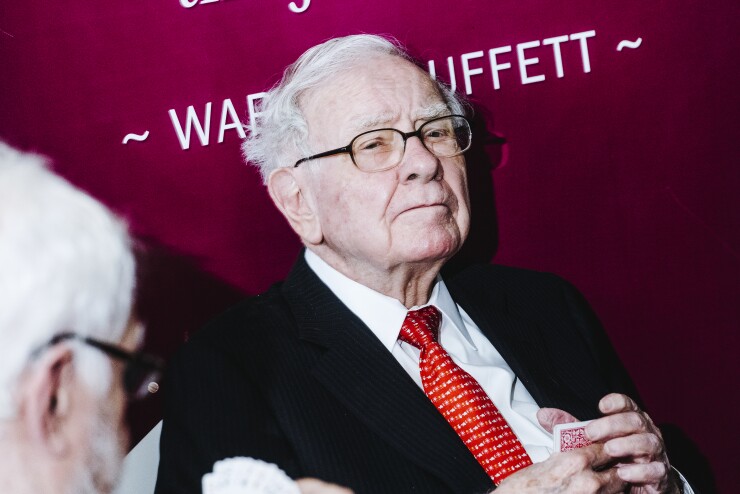Berkshire Hathaway Inc. Chairman Warren Buffett said the company has paid the U.S. government more than $101 billion in taxes since he took the helm 60 years ago, more than any other firm in history, according to his annual letter to investors on Saturday.
Buffett's comments come as President Donald Trump has vowed to cut corporate taxes further after slashing them to 21% during his first term in 2017. Trump wants to
Berkshire paid $26.8 billion in taxes in 2024 alone. Buffett said that "record-shattering" figure amounts to roughly 5% of the total taxes paid by U.S. companies last year, and excludes state taxes and taxes paid to foreign governments.
"If Berkshire had sent the Treasury a $1 million check every 20 minutes throughout all of 2024 — visualize 366 days and nights because 2024 was a leap year — we still would have owed the federal government a significant sum at yearend," Buffett wrote.
Berkshire's 2024 tax bill exceeded that of the previous five years combined, owing in part to his significant sales last year of two of its biggest holdings, Apple Inc. and Bank of America Corp., according to Edward Jones analyst Jim Shanahan.
"He's boasting about taxes, but it's kind of an unusual year," Shanahan said. "I don't know if he was specifically trying to call out large tech companies that don't pay much in terms of cash taxes, but certainly if I'm reading between the lines, that's what I'm seeing."
Cathy Seifert, an analyst at CFRA, interpreted the comments in a similar way.
"I think the underlying message is: 'Don't lump every multibillion-dollar corporation as even; some pay their fair share of taxes'," Seifert said in an interview.
Berkshire reported on Saturday that its operating profits for the fourth quarter surged 71%, driven by a nearly 50% jump in insurance investment income and improvement in its insurance underwriting business. Its annual operating earnings rose to $47.4 billion, up nearly 27% from the previous year.
Vast conglomerate
In the annual letter, Buffett said that when he took control of the Berkshire Hathaway company in 1965, it was a struggling textile operation that paid zero in income taxes that year, and hadn't for much of the previous decade.
"That sort of economic behavior may be understandable for glamorous startups, but it's a blinking yellow light when it happens at a venerable pillar of American industry," Buffett wrote. "Berkshire was headed for the ash can."
Today, Berkshire Hathaway is a vast conglomerate spanning more than 189 operating companies, a public equity portfolio worth $272 billion and a cash pile worth $334 billion as of the end of 2024, according to the annual report. Buffett said the company's success is due in large part to America's capitalist economy, a system that he said has its faults — "in certain respects more egregious now than ever" — but also "can work wonders unmatched" by other models.
Buffett also credited Berkshire's investors for foregoing dividends to reinvest their income, noting that the company only paid investors one dividend, in 1967. He said he couldn't recall why he suggested the move to Berkshire's board, a decision he said "seems like a bad dream."
Buffett addressed part of the letter to "Uncle Sam."
"Someday your nieces and nephews at Berkshire hope to send you even larger payments than we did in 2024," he wrote. "Spend it wisely. Take care of the many who, for no fault of their own, get the short straws in life. They deserve better."
Seifert called the comments "a subtle yet important swipe" at the current political environment.






